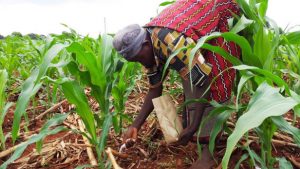 Fertiliser consumption in West Africa is one of the lowest in the world, a report of the Committee on Food, Agriculture and Cocoa Affairs in Parliament, has revealed.
Fertiliser consumption in West Africa is one of the lowest in the world, a report of the Committee on Food, Agriculture and Cocoa Affairs in Parliament, has revealed.
According to the report, the Food Agriculture Organisation(FAO) has recommended that in order to meet the objective of a six percent annual growth of agricultural productivity that was set by the Comprehensive Africa Agriculture Development Programme(CAADP) adopted by NEPAD in 2003, the average annual fertilizer application rate in West Africa should be increased from the current 8kilogram per hectare to 23kilogram per hectare.
Chairman of Parliament’s Committee on Food, Agriculture and Cocoa Affairs, Gabriel K.Essilfie said “Such advocacy for increased fertilizer use must also be complemented by the need to strengthen fertilizer quality control”.
Mr Essilfie also stated that regulating trans-border movement of seeds and fertilisers across the sub-region was essential in ensuring availability of quality seeds and fertilisers among ECOWAS Member countries as part of measures to increasing productivity and achieving food security.
The report further explains that a study by International Fertiliser Development Centre(IFDC) in 1995 on the quality of fertilisers marketed in West Africa indicated that even though the physical properties of marketed fertilisers are acceptable,43percent of products were nutrient deficient whilst 58percent were deficient in weight.
Additionally, fake products were commonly found in the market. A more recent study conducted by ECOWAS in 2010 also showed that the observations made in the previous study still persist in the market. The two studies have attributed the problems to the liberalization of importation and distribution of fertilizer across the sub-region without appropriate regulatory frameworks to control the fertilizer trade.
It is for this reason that Parliament has approved the committee report on the Ratification of Regulation on Harmonisation of Rules governing Quality Control, Certification and Marketing of Plant Seeds and Seedlings – relating to Fertiliser Quality Control in ECOWAS region
It is estimated that potential demand for seed for six crops (maize,rice,sorghum,cowpea,soybean and ground) in seven countries- Ghana, Nigeria, Burkina Faso, Senegal, Niger,Mali and Gambia increased from 565,000 to 762,676 tonnes between 2009 and 2012, whilst actual seed supply during the same period increased from 35,000 to 99,452 tonnes, the committee report on the Food, Agriculture and Cocoa Affairs indicated.
According to the committee report on the Ratification of Regulation on Harmonisation of Rules governing Quality Control,Certification and Marketing of Plant Seeds and Seedlings – relating to Fertiliser Quality Control in ECOWAS region; farmers are increasingly getting access to more quality certified seeds and the private sector investment in seed production and distribution is flourishing.
To sustain the private sector drive in the seed sector whilst at the same time maintaining quality, it has become necessary for the need to have a legal framework to regulate the trans-boundary trade of seeds among ECOWAS countries hence the decision of the Regional body to adopt the Regulation on Harmonisation of the Rules Governing Quality Control, Certification and Marketing of Plant Seeds and Seedlings.
Source: B&FT





